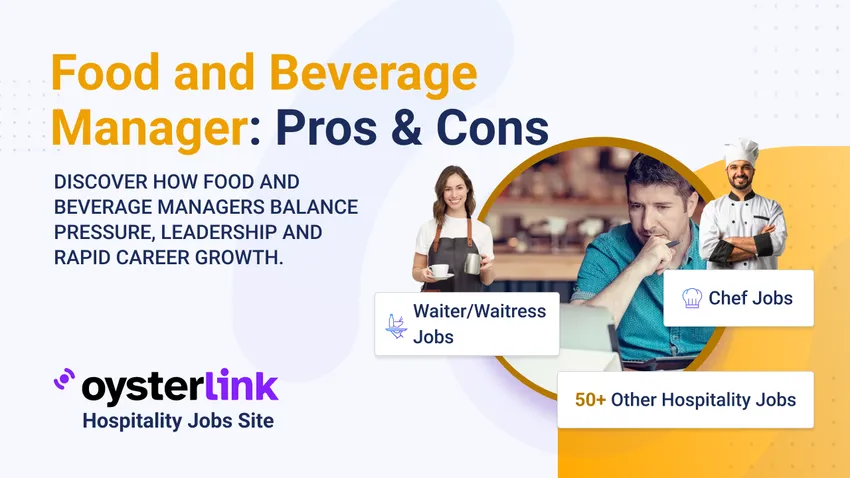Thinking about becoming a Food and Beverage Manager?
Before you commit, here’s a detailed breakdown of the pros, cons, and key insights to help you decide if it’s the right path for you.
What Is a Food and Beverage Manager?
A Beverage Manager oversees everything related to drinks in a restaurant or bar.
They handle menu creation, purchasing and inventory, and ensure the bar team delivers consistent quality. Their goal is to keep the beverage program profitable and guests satisfied.
Pros of Being a Food and Beverage Manager
Below, we’ll explore the key benefits of working as a Food and Beverage Manager, including career growth opportunities and the dynamic nature of the job.
1. Strong Career Growth and Advancement Opportunities
A Food and Beverage Manager role provides a clear path for advancement into higher positions, such as:
- Director of Food and Beverage
- General Manager of a hotel or restaurant
- Regional or corporate-level management in hospitality chains
For those looking to build a long-term career in hospitality, this role offers strong professional growth.
2. Leadership and Team Management Experience
As a Food and Beverage Manager, you will:
- Supervise and train service staff, Bartenders, and kitchen teams
- Implement service protocols and maintain high customer service standards
- Handle scheduling, hiring, and performance management
3. Competitive Salary With Performance-Based Bonuses
Food and Beverage Managers earn a solid salary, with additional income potential from performance-based incentives.
Average salaries include:
- Entry-level: $50,000–$70,000 per year
- Mid-level (5–10 years of experience): $70,000–$100,000 per year
- High-end hotels, resorts, and corporate roles: $100,000–$150,000+ per year
Bonuses are often based on meeting revenue, customer satisfaction, and operational efficiency targets.
4. Dynamic and Engaging Work Environment
Unlike office jobs, this role is fast-paced and requires:
- Managing daily food and beverage service operations
- Coordinating large-scale events, banquets, and VIP dining experiences
- Ensuring seamless front-of-house and back-of-house collaboration
5. Opportunity to Work in Luxury and High-End Establishments
Many Food and Beverage Managers work in:
- Fine dining restaurants and Michelin-starred venues
- Luxury hotels, resorts, and cruise ships
- Prestigious private clubs and catering businesses
6. Hands-On Involvement in Menu Planning and Beverage Programs
Food and Beverage Managers collaborate with Chefs and Bartenders to:
- Develop seasonal menus and innovative drink selections
- Ensure food and beverage quality meets brand standards
- Optimize pricing and inventory to maximize profitability
Cons of Being a Food and Beverage Manager
While this job offers many benefits, it also comes with challenges, including long hours, high stress, and demanding customers.
1. Long and Unpredictable Work Hours
Food and Beverage Managers often work:
- Evenings, weekends, and holidays due to peak business times
- Early mornings for ordering and inventory checks
- Late nights to oversee service operations and closing duties
2. High-Pressure Work Environment
The role involves constant multitasking and handling high-stress situations, such as:
- Managing unexpected staff shortages or customer complaints
- Ensuring fast service during peak hours and special events
- Handling last-minute changes in catering or menu requests
3. Balancing Budget and Cost Control Challenges
Food and Beverage Managers are responsible for:
- Controlling food and labor costs while maintaining service quality
- Managing supplier contracts and negotiating pricing
- Reducing food waste and monitoring inventory efficiency
4. Dealing With Difficult Customers and Staff Conflicts
This role requires strong conflict resolution skills to handle:
- Unhappy guests who complain about food quality or service delays
- Staff disputes or disciplinary issues within the team
- High-maintenance VIP guests with special requests
5. Physical and Mental Demands
Food and Beverage Managers spend most of their shifts:
- Walking and standing for long hours
- Lifting inventory, moving tables, or assisting staff when needed
- Handling multiple operational challenges in real time
6. Strict Compliance and Health Code Regulations
Managers must ensure their establishment follows:
- Food safety and sanitation guidelines
- Liquor licensing and responsible alcohol service laws
- Labor laws and workplace safety regulations
Hospitality Leadership Skills You’ll Develop
This role builds essential hospitality leadership skills such as decision-making, conflict resolution and team development.
Managers learn how to lead diverse teams while ensuring high service standards. These skills are transferable across the entire hospitality industry.
Work Challenges Every Food and Beverage Manager Faces
Food and Beverage Managers face daily challenges ranging from staffing shortages to customer complaints.
The fast-paced environment demands quick thinking and calm under pressure. Understanding these realities helps candidates decide whether the role fits their personality.
Food and Beverage Manager Career Growth Pathways
A Food and Beverage Manager has multiple opportunities to advance into higher hospitality leadership roles.
With experience, they can move into director-level positions, oversee multiple venues or transition into corporate roles.
This pathway makes the job ideal for people aiming for long-term career growth.
Conclusion: Is a Food and Beverage Manager Career Right for You?
Being a Food and Beverage Manager isn’t for everyone—but for the right person, it’s a high-reward career with real growth potential.
If you thrive in fast-paced environments, love leading teams, and want to make your mark in hospitality, this role offers a clear path to six-figure earnings.
Just be ready to work hard, think fast, and lead under pressure.
For those who are up for the challenge, it’s one of the most dynamic and rewarding roles in the industry.













Loading comments...